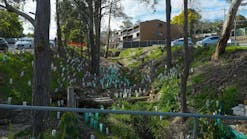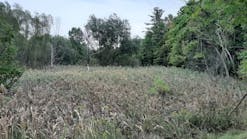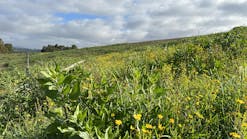Thirty-one years ago, at age 28, David Chenoweth and his wife Liz left successful careers and used their life savings to start Western States Reclamation (WSRI), of which he is president. Chenoweth had been a staff soil scientist and permits coordinator/project manager for ARCO Coal Co. Liz had worked for Exxon and later for ARCO in business development. In the three decades since its beginning, WSRI has experienced steady growth in response to continually increased and enhanced environmental regulations and has completed projects in 17 states. More than half of the annual contract volume is in negotiated or select bidder’s list projects. The company has two niches: environmental baseline studies and revegetation plans through its sister company, Chenoweth & Associates Environmental Consultants. WSRI follows through with construction, maintenance, and monitoring. Another growing niche is that of aerial revegetation on forest fire burn areas.
What He Does Day to Day
Chenoweth, a certified professional soil scientist, spends his days on business development, mentoring the employees-who do the fieldwork-and consulting for Chenoweth & Associates projects.
What Led Him Into This Line of Work
Chenoweth received a Bachelor of Science degree in natural resource management with a minor in soil science from Kansas State University. He completed graduate course work at the University of Colorado and Colorado School of Mines. Chenoweth’s father was a significant influence on his career choice. His father, whom Chenoweth recalls as a “very conservation-minded gentleman farmer,” enlisted Chenoweth’s help on the family’s southeastern Kansas farm. At age eight, Chenoweth was clearing brush and managing pastures. A few years later, he was operating an old International Super C tractor to perform bush hog mowing and cultivation projects. He reseeded degraded pasture areas. During his college senior year, Chenoweth -interested in how drastically disturbed mine land could be returned to cropland and recreational areas-completed an independent study on coalmine reclamation in southeastern Kansas. For two summers, he interned with the Soil Conservation Service, now the Natural Resources Conservation Service, working as a surveyor and soil compaction tester on watershed dam construction. Chenoweth was fascinated by the seeding contractor’s operation during the projects’ final phases. He established a small seeding operation in Topeka, KS, during the summer before his college senior year. “I would complete grading, seeding, and straw mulching for new home sites. I was the only person to use crimped straw mulch on lawns,” Chenoweth notes. He was getting better and faster establishment of lawns-outstripping his competitors-and more business than he could handle. Chenoweth considered full-time landscaping and seeding until he accepted an ARCO job. He declined a subsequent relocation offer and then started WSRI. Contracts poured in from the mining and oil-and-gas industries. In its second year, WSRI branched out into completing seeding and erosion control work on highway projects, land development, and schools and landscape construction services.
What He Likes About His Work
Chenoweth says he’s not grown tired of the business. “The thrill of watching our crews perform work is still there, not to mention the pride in being able to drive past our projects years later and be able to say we did that job. My staff and I have often reflected on how you can’t go more than 30 miles in any direction of Colorado without passing a WSRI project, not to mention the projects we have completed in other states.” A steady flow of phone calls and e-mails from clients thanking WSRI for a “job well done” puts the frosting on the cake for Chenoweth.







